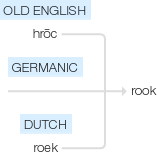Rook
Old English hrōc, probably imitative and of Germanic origin; related to Dutch roek .
wiktionary
From Middle English rok, roke, from Old English hrōc, from Proto-West Germanic *hrōk, from Proto-Germanic *hrōkaz (compare Old Norse hrókr, Saterland Frisian Rouk, Dutch roek, obsolete German Ruch), from Proto-Indo-European *kerk-(“crow, raven”) (compare Old Irish cerc(“hen”), Old Prussian kerko(“loon, diver”), dialectal Bulgarian кро́кон(krókon, “raven”), Ancient Greek κόραξ(kórax, “crow”), Old Armenian ագռաւ(agṙaw), Avestan 𐬐𐬀𐬵𐬭𐬐𐬀𐬙𐬀𐬝 (kahrkatat̰, “rooster”), Sanskrit कृकर(kṛkara, “rooster”)), Ukrainian крук(kruk, “raven”).
From Middle English rook, roke, rok, from Old French roc, ultimately from Persian رخ (rox), from Middle Persian lhw'(rox, “rook, castle (chess)”), possibly from Sanskrit रथ(ratha, “chariot”). Compare roc.
From rookie.
From Middle English roke, rock, rok(“mist; vapour; drizzle; smoke; fumes”), from Old Norse *rauk, related to Icelandic rok, roka(“whirlwind; seafoam; seaspray”), Middle Dutch rooc, rok, Modern Dutch rook(“smoke; fog”).
rook (third-person singular simple present rooks, present participle rooking, simple past and past participle rooked)
rook (third-person singular simple present rooks, present participle rooking, simple past and past participle rooked)
etymonline
rook (n.1)
[European crow], Middle English roke, from Old English hroc, from Proto-Germanic *khrokaz (source also of Old Norse hrokr, Middle Dutch roec, Dutch roek, Middle Swedish roka, Old High German hruoh "crow"), probably imitative of its raucous voice. Compare crow (n.), also Gaelic roc "croak," Sanskrit kruc "to cry out." Used as a disparaging term for persons at least since c. 1500, and extended by 1570s to mean "a cheat," especially at cards or dice, also, later "a simpleton, a gull, one liable to be cheated" (1590s). For sense, compare gull (n.2).
rook (n.2)
[chess piece], c. 1300, roke, in chess, "one of the four pieces placed on the corners of the board," from Old French roc, Medieval Latin rocus, rochus, all from Arabic rukhkh, from Persian rukh, a name of unknown meaning, perhaps somehow related to the Indian name for the piece, rut, from Hindi rath "chariot." It was confused in Middle English with roc.
rook (v.)
"to defraud by cheating" (originally especially in a game), 1580s, probably from rook (n.1) in the "cheat" sense. Related: Rooked; rooking.
